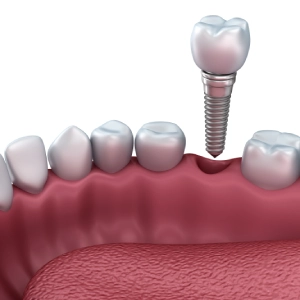Have you ever wondered what they don't tell you about dental implants? As you consider getting dental implants, it's important to know more than just the basics. While dental implants offer impressive benefits in terms of both function and appearance, there are important details and lesser-known aspects that are still not known.
In this blog, we will uncover what they don't tell you about dental implants. Let's shed light on 7 lesser-known aspects of this tooth replacement choice.
7 Things You Don't Know About Dental Implants
Here are a few lesser-known facts that nobody tells you about Dental Implants:
Dental Implants Resemble Natural Teeth
Dental implants replicate your natural teeth' color, shape, and size. They permanently anchor into your jawbone, functioning just like real teeth, enabling you to eat and speak normally.
Protecting Existing Teeth
Gaps from missing teeth can disrupt the alignment of your remaining teeth, leading to swollen gums and jaw discomfort. Without intervention, these gaps may spread infections to adjacent healthy teeth.
Dental Implants Are Cavity-Free
Made from synthetic materials, dental implants are resistant to cavities. Nevertheless, it's crucial to brush your artificial teeth regularly, just like you brush your natural teeth.
Anyone Can Receive a Dental Implant
Dental implants offer an effective solution regardless of age or dental issues like missing teeth, damage, infection, or decay. Opting for a permanent fix can prevent future damage and discomfort. Consult your dentist to explore how dental implants can enhance your oral health.
You Don't Have to Replace Healthy Teeth
One common misunderstanding about dental implants is the belief that they must replace all of your teeth. While this might apply to patients with extensive tooth damage or loss, many individuals only need one or a few dental implants.
There's no requirement to replace your healthy teeth. Tooth replacement is solely necessary for severely damaged or missing teeth. Your healthy teeth can remain as they are!
Dental Implants Stabilize Your Jawbone
Losing teeth can damage your jawbone. When a tooth is missing, the bone underneath can start to weaken because it doesn't have to support a tooth anymore. Installing an artificial tooth can stop this bone loss.
The loss of a healthy jawbone can affect your other teeth, too. They might move and shift because the jawbone becomes less stable. Dental implants provide stability, preventing problems for your other teeth caused by weakened bone structure.
Dental Implants Are Quite Easy To Take Care of
Adding a dental implant enhances your natural teeth. You care for them just like your regular smile, making maintenance super easy.
The only regular upkeep for your artificial tooth is brushing. However, if you chip or break an implant, similar to natural teeth, you might need repair or replacement.
Am I Suitable for Dental Implants?
Your dentist will consider certain factors, including reasons why dental implants might not be suitable for you, to decide if you're eligible for the procedure. These factors are crucial in determining if dental implants are right for you.
Adequate Bone Density:
Dental implants require a strong jawbone to securely integrate the titanium screw. If your jaw lacks density, bone grafting might be necessary for a successful procedure.
Gum Health:
Healthy gums are vital for dental implant success. If you show signs of gum disease, comprehensive treatment like scaling and root planing may be necessary before proceeding with implants.
Physical Health:
Certain health factors, such as pregnancy, excessive smoking, chronic conditions, or steroid use, may impact the success of dental implants. Adopting healthy lifestyle habits can contribute to lasting oral health with implants.
How long does it take to recover after getting dental implants?
After getting dental implants, it's important to know how long it takes to heal. Usually, the recovery time lasts a few days to a week. During this time, you might feel some mild discomfort and swelling. But don't worry, it's temporary! With proper care after the surgery, you'll soon be smiling confidently again.
So, there you have it- what they don't tell you about dental implants. They have lots of benefits, but it's also important to know about things like recovery time, the risk of infection, and taking good care of your teeth. Dental implants might not be right for everyone, but a dentist can help you decide.
Interested in learning more about dental implants?
Contact Arlington Dental Excellence, located in Arlington, VA, to book an appointment with the expert for a consultation. New patients can call at (703) 420-3253, while all other callers can reach out at (703) 525-0157.
FAQ
Are dental implants suitable for everyone?
Dental implants may not be suitable for everyone. Factors such as overall health, bone density, and gum health can affect candidacy. Consulting with a dentist can help determine if dental implants are the right option for you.
What is the recovery time after getting dental implants?
The recovery time after getting dental implants varies from person to person. Typically, it lasts a few days to a week. During this period, patients may experience mild discomfort and swelling. However, with proper post-operative care, most individuals resume normal activities within a short time.
What's the most common problem with dental implants?
The main issue is when an implant becomes loose. This can happen if the jawbone isn't strong enough to hold the implant, often because the bone has weakened due to aging.





